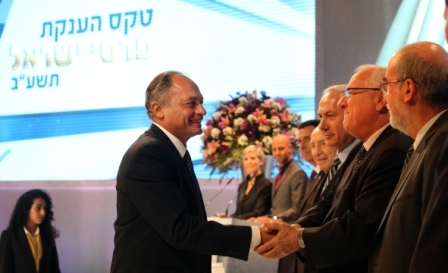On Israel Independence Day, the Institute’s
Prof. David Milstein received the 2012 Israel Prize for chemistry and physics. The Israel Prize is the country’s highest honor.
Interactions between metal atoms and organic molecules are at the heart of Milstein’s work, and he is a leader in the field of organo-metallic chemistry. Based on principles he discovered, including new ways to selectively activate chemical bonds, he developed novel catalysts that are environmentally friendly: They work with low energy input and mild conditions, emit no pollutants and do not require the addition of harsh chemicals.
In 2007, Science magazine cited as one of ten “breakthroughs of the year” his group’s development of a ruthenium-based catalyst to convert starting compounds, called amines and alcohols, directly into another class of widely useful compounds, called amides, which play crucial roles in chemistry and biology. This catalyst, called the “Milstein catalyst,” is used today in labs around the world. Two of Milstein’s catalysts are now being marketed worldwide by Strem Chemicals, Inc. and a major multinational corporation has shown strong interest in a third.
In other recent work, Milstein has not only demonstrated greener ways of producing vital organic compounds but has also developed new chemical reactions for sustainable energy. For instance, in 2009, he devised a two-step sequence that uses sunlight to split water into hydrogen and oxygen, and releases no chemical waste. Crucial to the process is a completely new way of generating an oxygen (O2) molecule.
Yet another new reaction process developed in Milstein’s lab may, in the future, lead to practical methods for turning waste carbon dioxide (CO2) into fuel. New versions of the organic-metal catalysts were used to create methanol from CO2. The chemical reaction is both green and mild, and fuel production based on this method could recycle greenhouse gasses in the process. In the latest research to come out of his lab, yet another new ruthenium-based catalyst was used to produce primary amines – compounds that are widely used in the chemical and pharmaceutical industries. These compounds are generally produced at high pressures and temperatures, and generate a fair amount of waste; but the new method works at low temperatures and pressures, and yields are selective for the desired compound with no waste.
Milstein studied under Prof. Jochanan Blum at the Hebrew University of Jerusalem, receiving his Ph.D. in 1976. His postdoctoral research was conducted at the University of Iowa and Colorado State University, where he invented, together with his adviser John K. Stille, the Stille reaction, which is widely used for the generation of carbon-carbon bonds. He then went on to work in the Central Research and Development Department at DuPont Co. (Wilmington, USA). Milstein joined the Weizmann Institute faculty in 1987. In 1996, he was appointed Head of the Organic Chemistry Department, a position he held for three consecutive terms. In 2000, he founded the Kimmel Center for Molecular Design, and he continues to head this Center today.
Prof. David Milstein’s research is supported by the Helen and Martin Kimmel Center for Molecular Design, which he heads; the Bernice and Peter Cohn Catalysis Research Fund; and the European Research Council. Prof. Milstein is the incumbent of the Israel Matz Professorial Chair of Organic Chemistry.
